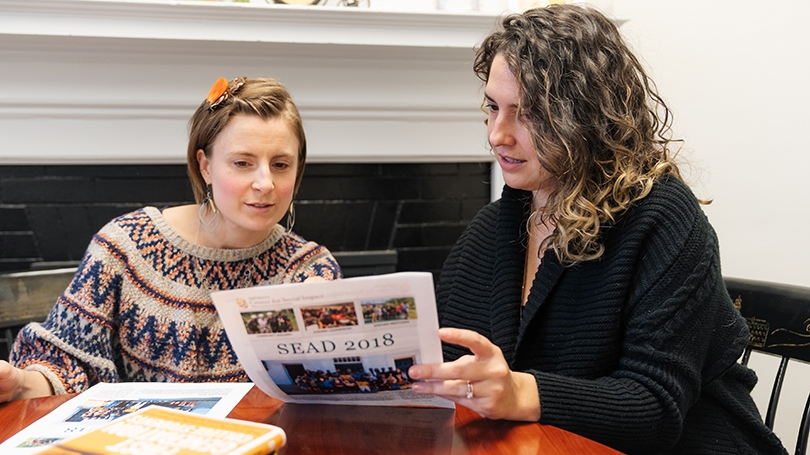
- About
- Programs & Initiatives
- Alumni
- News & Events
Back to Top Nav
Back to Top Nav
Year-round mentoring helps low-income, first-generation students prepare for college.
Summer Enrichment at Dartmouth (SEAD), a program that helps promising high school students prepare for and apply to colleges, is changing its focus. Starting this year, all the enrollees will come from Upper Valley communities.
Soon to begin its 17th season, SEAD will continue to recruit students from under-resourced families whose parents have not graduated from a four-year college. In years past, SEAD recruited students from towns and cities throughout the U.S. Now, because the participating high schools are within a 30-mile radius of the College, more concentrated mentoring can take place throughout the four years students are enrolled.
“The change allows for a deeper connection between Dartmouth students and high school students, allowing the Dartmouth mentors to be immersed in local communities and schools, and to bring the high-schoolers to campus more often,” says Ashley Doolittle, associate director of the Dartmouth Center for Social Impact (DCSI), which sponsors SEAD.
The center’s director, Tracy Dustin-Eichler, says connecting with high schools closer to campus is “an opportunity for Dartmouth students to learn deeply about educational policy and educational access in a rural locale, and it’s an opportunity for us to support college aspirations of first-generation, low-income students in the Upper Valley.”
SEAD has three major components: an immersive summer session in which secondary students from New Hampshire and Vermont live and learn on Dartmouth’s campus for a week; an academic-year curriculum taught by a trained cohort of Dartmouth undergraduates who help the high-schoolers prepare for college; and ongoing college support through coaching and leadership opportunities, connecting SEAD scholars with campus resources at their respective institutions of higher education.
High school students enter SEAD during their sophomore year and remain in the program through their first year in college. “That’s an important pivot point, from the last year of high school through their first year of college,” says Doolittle, “and we want to help our SEAD scholars through that crucial transition.”
The partner schools for the next four-year cohort are Stevens High School in Claremont, N.H., Rivendell Academy in Orford, N.H., and Hartford High School in Hartford, Vt. SEAD hopes to add more schools in the coming years.
Caitlin Wubbena, DCSI’s program manager for educational access and equity, says each school advocates strongly for promising low-income students. “In talking with the school administrators, I heard inspiring stories about students who, despite challenging circumstances, show up and work intentionally to discover the places where they will make an impact,” says Wubbena. “I saw educators beaming with pride about their students who, with the support of SEAD, will make a difference in their families, their communities, and the world.”
Charlotte Albright can be reached at charlotte.e.albright@dartmouth.edu.